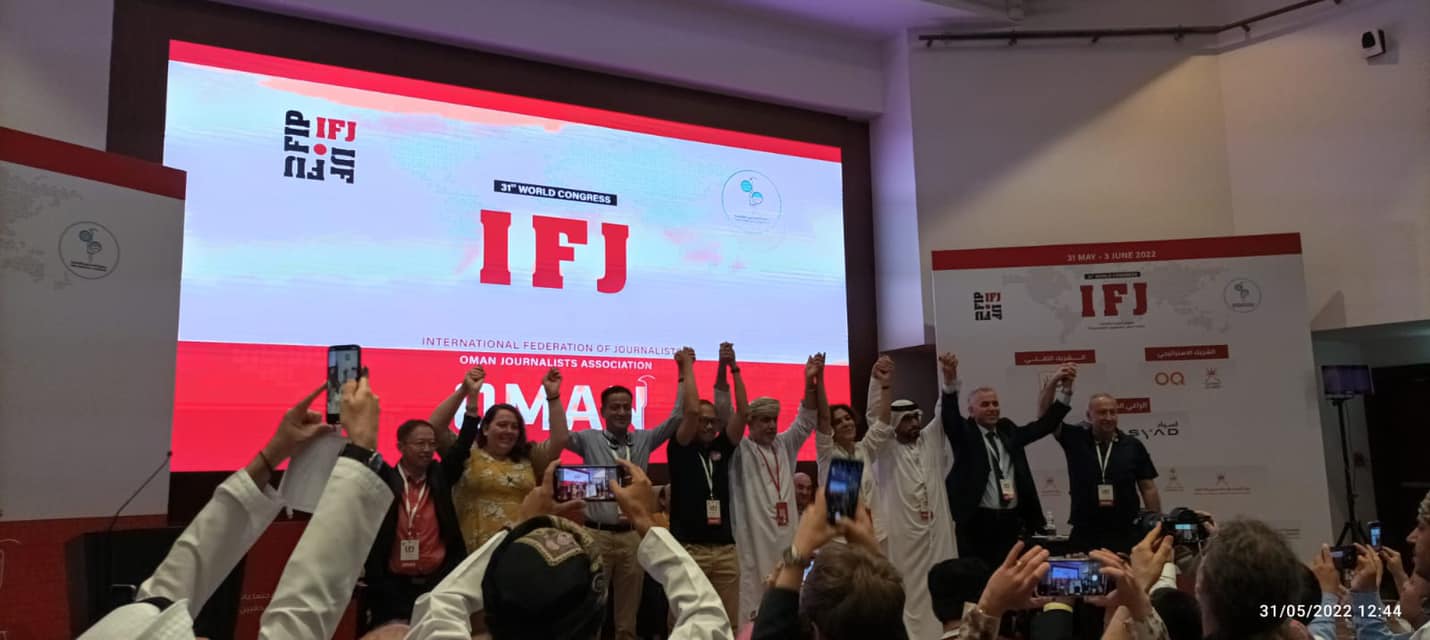Newly elected Federation of Asia-Pacific Journalists (FAPaJ) executive committee (Photo by Jonathan De Santos)
MANILA — Asia Pacific delegates of the International Federation of Journalists (IFJ) formed a new regional group during the organization’s 31st World Congress on May 31, 2022. National Union of Journalists of the Philippines (NUJP) Chairperson Jonathan De Santos was elected as a member of its executive committee.
The Federation of Asia-Pacific Journalists (FAPaJ) is composed of representatives from the Pacific, Western Asia, Eastern Asia, Southern Asia, and Central Asia. It is the fourth regional group to be formed under IFJ.
The 31st World Congress of IFJ took place from May 31 until June 3 in Muscat, Oman. Over 250 participants representing journalists’ unions and associations from all over the world attended the congress, which key themes included the increasing surveillance of journalists and actions to end impunity for crimes against media workers.
IFJ General Secretary, Anthony Bellanger commended the new federation and said that the Asia Pacific region was the missing piece among IFJ’s history of international journalist federations.
“We hope the Federation of Asia Pacific Journalists (FAPaJ) will be a strong platform for journalists and media workers in this diverse and important region,” said Bellanger.
IFJ Vice President and General-Secretary of the India Journalists Union (IJU) Sabina Inderjit was elected as FAPaJ’s first president, while Salem Al Jahwari was elected as its vice president unopposed. Besides De Santos, also elected as Executive Committee were Mousa Abdul Nour, Ali Yousef, Mohammad Alhammadi, Leigh Tonkin and Badri Sigdel.
The new regional group already adopted several resolutions, and voted unanimously to condemn the increasing assaults against the media in the region. The group also called to increase the monitoring of the arrests and trials of journalists, as well as other press freedom violations that are being perpetrated against media colleagues.
De Santos said being elected as part of FAPaJ’s executive committee signifies more opportunities for collaboration within the region.
“While we represent the ‘Eastern Asia’ region at the federation, the sub-regional organization will be based on the Southeast Asian Journalists Unions, where Indonesia — particularly through Aliansi Jurnalis Independen — has been taking the lead,” said De Santos.
“We hope that this means that Southeast Asian journalists’ unions and our issues and concerns will be heard more within the larger region,” he added.
Malaysia’s Chun Sung Chew is also part of the committee.
De Santos also mentioned that the Southeast Asia unions, as well as the Association of Taiwan Journalists, are hoping to meet again this year to discuss future plans.
The new Asian federation is looking forward to working together on campaigns focused on safety against online harassment, organizing for job security, as well as fighting for the rights of freelance and digital workers against the misuse of the law to silence and harass journalists. — Alyssa Mae Clarin, NUJP Secretariat




